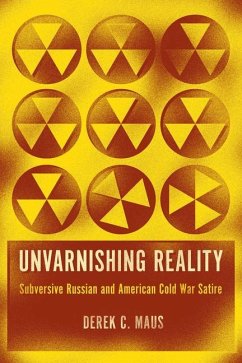Maus surveys the background of each nation's culture, language, sociology, politics, and philosophy to map the foundation on which cold war satire was built. By highlighting common themes of utopianism, technology, and propaganda, Maus effectively shows the ultimate motive of satirists on both sides was to question the various forces contributing to the cold war and to expose the absurdity of the continuous tension that pulsed between the United States and the Soviet Union for nearly half a century. The thematic scope of these satires transcends cultural differences, and, as Maus demonstrates, these writers saw that there was not only the atomic bomb to fear, but also the dangers of complete national militarization and the constant polarizing threat of emergency. Thus their cold war critiques still resonate today and invite further comparative studies such as this one.
Hinweis: Dieser Artikel kann nur an eine deutsche Lieferadresse ausgeliefert werden.
Hinweis: Dieser Artikel kann nur an eine deutsche Lieferadresse ausgeliefert werden.








